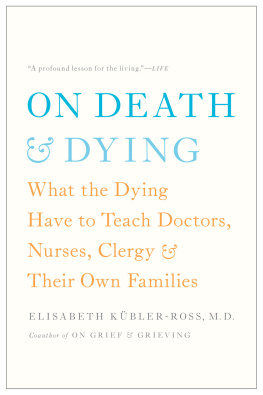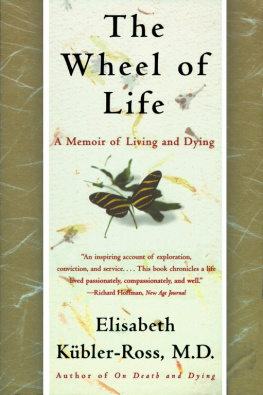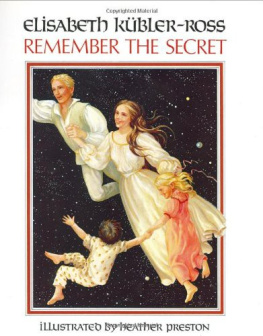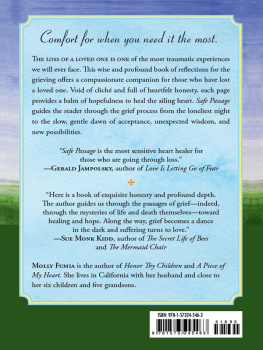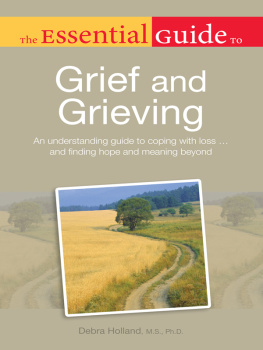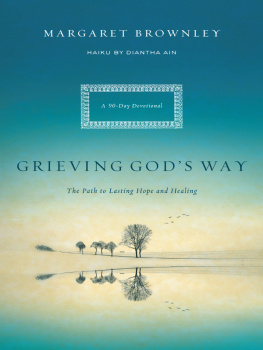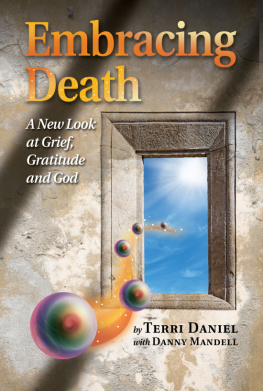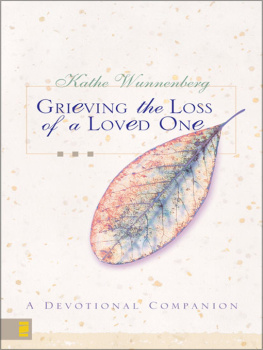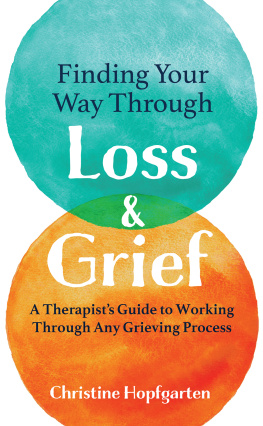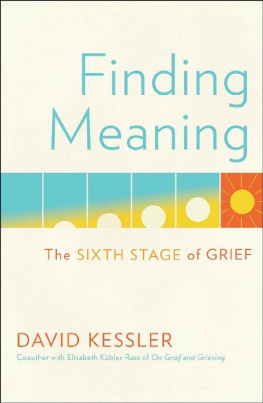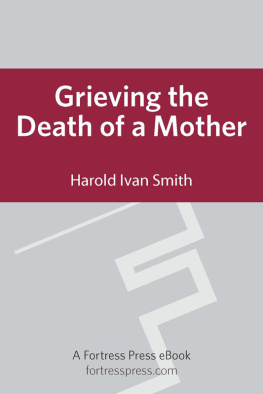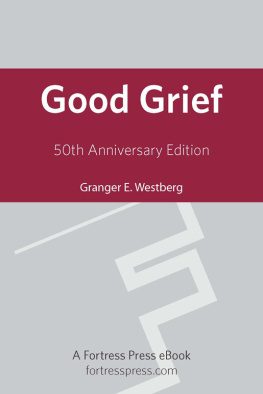For my beloved granddaughters,
Emma Sadie and Sylvia Anna,
who kept me going when I kept going.
Elisabeth
For two dear friends,
Berry Berenson Perkins and Wayne Hutchison;
love never dies.
David
Contents
Foreword to the Anniversary Edition
O ver the course of my lifetime I have come to know grief in its many forms. Not just through the deaths of family and friends, but also in the feelings of loss that come with the inevitable life changes we all endure. In my struggles to sort through the sweeping mix of emotions that come with grief, I have found myself endlessly grateful for Elisabeth Kbler-Rosss work, and in particular for this book by Elisabeth Kbler-Ross and David Kessler.
We are a grief-illiterate nation, and Kbler-Ross dedicated her life to helping people find peace in challenging losses. She gave us permission to grieve. Dr. Kbler-Ross let us know that none of us is alone in the devastating wake of feelings that come with the departure of those we love. She allowed us to let out a collective wail for all the losses we experience in our lives. In this book, she and David teach us how to grieve.
I grew up in a family that had lots of tragedy, but no one ever discussed it. I moved through these experiences, trying to make sense of the losses, without any guidance or framework for how to understand them. When I became an adult I realized that I was still trying to process what had happened, and I thought to myself that there must be a better way.
At some point people began mentioning Elisabeth Kbler-Ross to me, telling me that she had written about the five stages of grief. Every time this conversation about grief came up, so did her name. And I realized that talking about grief helped, and reading the works of Kbler-Ross reinforced the comfort that discussion could bring.
When my mother died four years ago I experienced the true depths of grief. I remember thinking when I was younger that if anything ever happened to my mother I would never be able to survive. And then she died, and I had to face it; I had to really feel it. It brought me to my knees. Then my uncle died two weeks after that. And then my father died a year and a half later. I was steeped in grief.
It was an incredibly lonely experience. I felt very isolated. My world stopped while everything continued on around me. In my search for solace I found comfort in others who had gone through a death or multiple deaths. Every time I came across someone elses story of grief I felt a little less alone. And this is exactly why this book by Kbler-Ross and Kessler is so important. When youre grieving, sometimes your only constant companion is a book.
My childrens book about grief, Whats Heaven? , was born out of this understanding. When my grandmother died, my children had so many questions. Their questions made me realize that I was just as childlike in my understanding of grief as they were. I felt this need to address the curiosity we all have about loss in its many forms, including grieving a pet. People thought this book wouldnt sell, and then it went on to tremendous success, proving just how thirsty our culture is for the conversation about loss and how we cope with it.
The truth is that grief can make you feel like youre going crazy. Grief can make a liar out of you. You say youre doing fine, when really your heart is shattered into a thousand tiny pieces. But everyone wants you to say youre okay, so you do. We live in a culture that doesnt know how to grieve. We dont know how to experience pain, how to understand its process. We live in a society that wants us to get back to normal as soon as possible. Were expected to go back to work immediately, keep moving, to get on with our lives. But it doesnt work that way.
We need time to move through the pain of loss. We need to step into it, really to get to know it, in order to learn how to live with it. In essence, thats what grief is. Its the opening up to the exquisite pain of absence. Its the moment when you stop trying to move on or change how much it hurts, and just let it out.
However, there is a natural resistance that we all run up against. I think that there is a fear that if you start crying you are never going to be able to stop. You think, What will I ever do? How will I survive without this person? But you do. You survive. You dont go on the same, but you do go on. You learn that other people have gone through it. You find hope in their journeys. Im so inspired when I meet people who have survived the loss of a child, the loss of a mate. I am in awe that they have somehow found the courage, the strength to move forward. It gives me strength.
Thats really what grief has taught me. That I can survive. I used to be afraid that if I experienced grief it would overcome me and I wouldnt be able to survive the flood of it, that if I actually felt it I wouldnt be able to get back up. Its taught me that I can feel it and it wont swallow me whole. But we come from a culture where we think people have to be strong. Im a big believer in being vulnerable, open to grief. That is strength. You cant know joy unless you know profound sadness. They dont exist without each other.
Kbler-Ross taught us that it is okay to be vulnerable. And in this book, she and David Kessler gave us a framework for how to do it, a road map to survive grief. It doesnt mean that everyone has to do it exactly as its laid out here. You can skip around, find your own process, but this book gives us a structure with which to hold that process in place. People go through these stages in their own time and in their own way. Kbler-Ross and Kessler state in this book, The stages have evolved since their introduction and they have been very misunderstood over the last few decades. They were never meant to help tuck messy emotions into neat packages. They are responses to loss that many people have, but there is not a typical response to loss as there is no typical loss. Our grief is as individual as our lives. Maybe it doesnt even go through all the stages. Any way you experience grief is your way, and Im a big believer that the more we talk about it, the more we go through the healing process, and the better we will be in time.
A few years ago when I broached the idea of discussing grief at my womens conference, people told me not to do it. It will make people uncomfortable, they said. I refused to listen to them and instead opened up about my mothers death to a room of fifteen thousand people. Then I sat down in conversation with three women who had lost children and spouses. You could have heard a pin drop. Everyone in that room, all fifteen thousand, had their own experiences of grief, but in that moment we were all one. This is how we heal, I realized. This is how we nurture each other. This is how we know that we are not alone.
Grief has made me brave. In opening up to it, in allowing myself to really feel it, I have grown stronger. But in order to do that I needed to hear the message that it was okay and in fact crucial to grieve. In this important book, Kbler-Ross and Kessler told me that it was okay. They told all of us that it is okay.
Elisabeth Kbler-Ross was the mother of a movement that began to make grief a real conversation. As a culture we must collectively carry her torch. We must finish what she began. We must let out our wails in unison, reminding the world that grief is real, that it is a part of the human condition, and that we will all survive.
M ARIA S HRIVER
Authors Note
T here is no correct way or time to grieve. We wrote this book hoping to familiarize the reader with the aspects of grief and grieving. No book should be used to replace professional help if that is needed. We hope this book will become a beacon by shedding light, hope, and comfort on the most difficult time we will all experience in our lives.


